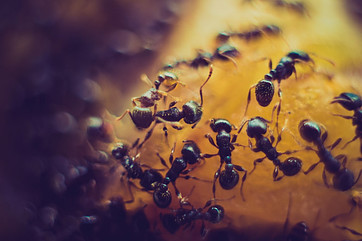Pesticides are commonly used to expel ants from around our property. Pesticides produce almost an instant result which makes them even more tempting to use. But how healthy are they to humans and pets, not to mention other beneficial creatures?
makes them even more tempting to use. But how healthy are they to humans and pets, not to mention other beneficial creatures?
Today, we’ll talk about how to get rid of ants from your property using homemade sprays, traps, and deterrents.
Using Natural Insecticides
1. Mix Vinegar and Water
A mixture of white vinegar and water works well in eliminating ants. This natural insecticide is very cheap to make; mix an equal solution of white vine and water. The emphasis is on white vinegar.
Pour the mixed solution into a spray bottle and spray it on ants to kill them. Use damp paper to wipe up the ants and discard them.
Vinegar and water are also great as a deterrent; just spray it around your house areas where you notice ants. Also, when the vinegar solution is used to clean any surface, ants may find it difficult to crawl such surfaces.
2. Mix Water and Dish Soap
Mix dish soap with water and store in a spraying bottle. Shake the mixture properly and spray it directly on any ants in your house. The mixture will immediately halt and suffocate them. Take a wet paper towel or any wet rag and wipe off the mess. A mixture of dish soap and water also works as a natural insecticide that kills ants and other insects. You can also try this mixture on roaches too. If you noticed that ants keep coming back, then find a solution to the source of the problem.
3. Try a Lemon Juice Solution
A solution of lemon juice is a good natural insecticide, especially if you don’t want the smell of vinegar. Simply spray lemon juice solution directly on the ants to eliminate them. Lemon juice has a strong concentration of citric acid, which ants are averse to. You can also use lemon juice solution as a deterrent by spraying it around different angles of your house.
4. Use Diatomaceous Earth
You can try sprinkling diatomaceous earth in your house as an insecticide. Food-grade diatomaceous earth can be used as an insecticide, but it doesn’t harm humans and pets. It is made of fossilized diatoms, grounded to a powder. Diatomaceous is potent as an insecticide because it dries out the exoskeletons of ants once they step on the powder.
This, in turn, dries out the body of the ants. You can sprinkle the powder around your house or any ant-infested area. Do this with the aid of a dusting board or an applicator.
Keep in mind that diatomaceous loses its potency when it becomes wet. Don’t spray it in a humid environment or use a dehumidifier in such areas. The diatomaceous will regain its potency once the air dries out.
It is recommended to always cover your face with a mask when handling diatomaceous earth. Though the powder isn’t harmful, the particles may be problematic to your lungs when ingested.
Laying Traps
1. Boric Acid Sugar Traps
This is a homemade, inexpensive, and extremely effective trap. You need a few index cards or cardboard, a bottle of any sticky sugar substance (like corn syrup), and boric acid powder. Once you get the above materials, follow the instruction below to make a trap using boric acid.
- Mix the same quantity of boric acid and corn syrup in a bowl until you get a paste-like texture. Make sure it is not runny; if it’s too wet, you can add more boric acid.
- Spread the mixture on the cardboard pieces with a spoon to form a trap.
2. Set the Trap at Places You Often See Ants
If ants tend to gather on your bathroom floor, set one trap there. Keep one on your front porch and another under your kitchen sink. You can also put the trap near your trash can or in your flower bed.
In essence, set the trap anywhere you often see ants. Ensure you keep the trap from the reach of kids won’t take long for ants to visit the trap, especially if it’s on an ant-infested area. This method may not eliminate the entire ants in your house, but it should reduce them significantly.
3. Kill the Larvae with Cornmeal Borax Trap
The worker ants do not feed on liquid but solids. They feed the larvae with solids which then convert the solid food to liquid for worker ants to feed on. Ensure that the borax and cornmeal dishes are not too high for ants to get in.
Trying Natural Deterrents
1. Try Lemon Juice
Lemon juice is a fine deterrent to ants and other tiny insects. Try sprinkling lemon juice at edges regularly used by ants. The presence of a strong concentration of citric acid in the lemon will chase away ants from using that path.
2. Use Essential Oils
Another potent deterrent for ants is the essential oils. While the smell is appealing to humans, ants detest the smell badly. Add few drops of the oil into a cup of water and spray the solution to repel ants. Try these oils:
- Lemon oil

- Cedar oil
- Peppermint oil
- Lavender oil
- Eucalyptus oil
Note: The eucalyptus oil is toxic to cats, so don’t use it near them. It doesn’t affect dogs in any way.
3. Maintain a Clean Surface
Always ensure that your surfaces are clean; not only does it looks pleasant, it also helps to keep ants away. Ants are attracted by the smell of foods, so keep your floors, cabinet, and countertops clean at all times.
Also, keep your food containers sealed. Containers of honey, sugar, syrup, and other foods that attract ants should be tightly sealed. Finally, clean up any spill immediately it happens, especially syrup spill or fruit juice.
4. Seal Your House
If your house is well sealed, ants may likely stay outdoor. Fill all crevices and cracks where ants could likely use to gain entrance into your house. Fill such a place with any sealants to deny them assess to your house. Sprinkle the areas with lemon water or lavender for good measure.
Conclusion
Ants’ infestation can be annoying, especially when they are all over your spilled food. You can try any of the methods discussed to free your home from an ant’s infestation. The good thing is that they are all cheap to produce and don’t pose any health threat.
Thank you so much for your time and reading this article; if you have some questions or something to share, please kindly leave your comment below, and I’ll be happy to write back to you.

Paul
How to kill ants without pesticides? How do you even do that? This very fact that you can kill pesticides without insecticide makes me more curious. I get a feeling that pesticides are totally killing humans as well in the long run. I didn’t know vinegar and water were such a great recipe when it comes to killing pests. I will definitely try this one.
Thank you.
admin
Hello Paul,
Thank you so much for your kind comment and for stopping by. I appreciate you very much. I’m glad that you found it a helpful and safer way than using pesticides. Thanks.
Joyce
Abel
You made me remember my nice childhood years. I remember selling lemonade for some cents. And some days, I wasn’t able to sell it all. So I would come back with some. One day I took a glass to my backyard and decided to share it with my friends the aunts. My lemon juice was strong. And to my surprise, I killed my friends.
admin
Hello Abel,
Thank you so much for your comment and for stopping. I appreciate it very much.
Best wishes,
Joyce